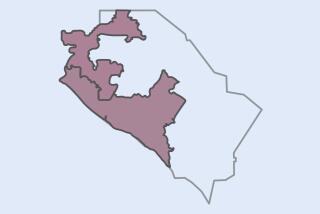DECISION ’94 : Congress: ORANGE COUNTY : Hot-Button Issues Focus of Congressional Races
Most of the 17 candidates running in the Democratic and Republican congressional primaries June 7 agree on the issues they think excite most Orange County voters: legislating business tax breaks to fix the California economy and finding ways to cut crime.
But in two of the six districts--the races attracting the most attention and the greatest number of candidates--the Republican incumbents, not these hot-button issues, are the focus of the campaigning.
In the 41st Congressional District, four Republicans and two Democrats have lined up to take on the one-term incumbent, Rep. Jay C. Kim (R-Diamond Bar), who is being investigated by several agencies for alleged campaign, labor and tax law violations relating to his former engineering firm, and his possible use of the business’s financial resources to bolster his 1992 congressional campaign.
And in the heart of Orange County, in the 46th Congressional District, six Democrats are engaged in a spirited contest for the right to challenge the incumbent, Rep. Robert K. Dornan (R-Garden Grove), in the November general election.
Dornan faces no opponents in the GOP primary after soundly defeating a well-financed moderate challenger, Judith Ryan, in the 1992 primary.
But Dornan looks vulnerable to Democrats because he barely won the general election against Robert John Banuelos, an underfunded, low-profile Democratic candidate. In addition, the 46th District is the only Orange County congressional district with more Democrat than Republican voters.
And with the conservative, outspoken congressman as a target, Orange County Democrats hope that the primary winner is strong enough to defeat Dornan and break the Republican Party’s hold on all the local seats in Congress.
Setting aside Dornan’s proven ability to win elections, having a cohesive party emerge from the primary could be a tough assignment for the six Democrats who have beaten each other during the campaign.
In an unusual move, three Democratic candidates--Madelene E. Arakelian, Banuelos (the 1992 nominee), and John M. Ivler--teamed up to criticize what they claimed were unethical campaign tactics being used by Mike Farber, another candidate in the race. They charged Farber with stealing campaign signs and claiming to have an endorsement that had been given to Banuelos.
Farber, who received the state Democratic Party’s pre-primary endorsement, denied the charges, saying he was being maligned because he is the front-runner.
In the 41st District, which includes a slice of northern Orange County and spans parts of Los Angeles and San Bernardino counties, incumbent Kim has virtually ignored the ongoing probes into his 1992 campaign after initially stating there was no wrongdoing on his part. Instead, he has run a low-key campaign focusing on the issues.
His Republican primary opponents, however, have campaigned on Kim’s troubles and the general theme of ethics in government.
The four--mining engineer Ronald L. Curtis of Upland, Ontario businessman Bob Kerns, Upland businesswoman Valerie Romero and attorney Todd R. Thakar of Orange--have played on Republican fears that if the investigations linger and Kim wins the nomination, then Democrats could successfully target a damaged candidate in November.
Kim’s supporters believe, however, that having multiple opponents helps their man. With four candidates diluting the anti-incumbent vote, Kim’s backers say he will survive the primary challenge.
Interestingly, national Democratic Party leaders have not focused too much attention on Kim, the first Korean American elected to Congress.
For now, both Democratic candidates--urban redeveloper Ed Tessier and attorney Richard Waldron--have largely ignored the ongoing probes. Instead, they say Kim’s voting record and his inattention to local issues make him vulnerable in November. Tessier said Kim had claimed to be a supporter of legal abortion in the last campaign, then cast an anti-abortion vote, and also voted against the Family Leave Act, which provides workers with time off for family emergencies.
And with neither party having a majority of the voter registration in the district--Republicans have 48% and Democrats 41%--Tessier said he expects voters in November to give equal consideration to the Democrats in the race.
Of the four other Republican incumbents in Orange County, only Reps. Christopher Cox of Newport Beach and Ron Packard of Carlsbad face primary opponents.
Challenging Cox in the 47th District is Steven J. Frogue, a Lake Forest high school teacher who received 12% of the vote two years ago when he first ran against Cox. Frogue disagrees with Cox’s vote in favor of the North American Free Trade Agreement.
In the 48th District, which takes in part of southern Orange County and northern San Diego County, Packard faces Ed Mayerhofer, a Mission Viejo realtor who received almost 16% of the vote when he ran against Packard in 1992.
More to Read
Get the L.A. Times Politics newsletter
Deeply reported insights into legislation, politics and policy from Sacramento, Washington and beyond. In your inbox three times per week.
You may occasionally receive promotional content from the Los Angeles Times.










